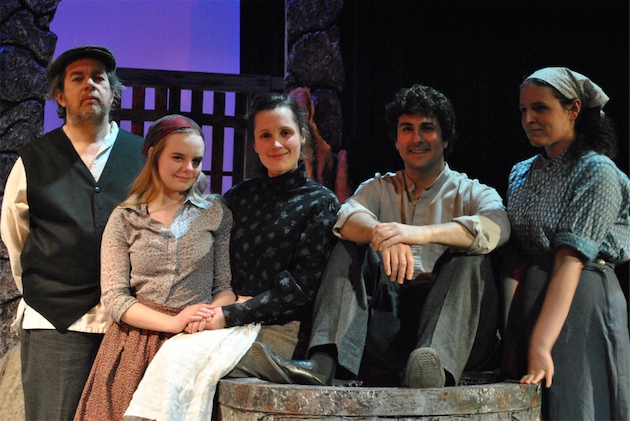 It was a cold and blustery night when I went to see Crime on Goat Island at the Boardmore Playhouse at CBU. This cold was added to by the set of the play: a flimsy door with holes and cracks, and a cold, dark stone well, placed downstage. I have a very particular spot I like to sit in when I see plays at the Playhouse, and this placed the well directly in front of me.
It was a cold and blustery night when I went to see Crime on Goat Island at the Boardmore Playhouse at CBU. This cold was added to by the set of the play: a flimsy door with holes and cracks, and a cold, dark stone well, placed downstage. I have a very particular spot I like to sit in when I see plays at the Playhouse, and this placed the well directly in front of me.
When the play started, I was worried. It was very low-key, very low energy, and even a bit boring. Everything seemed very fake and awkward, which seemed very odd to me as I know most of the actors in the show and I know what they’re capable of. Most of this awkwardness was centred around the three women in the play interacting with the character Angelo. It wasn’t until Angelo left the stage that the awkwardness made sense: it was a set-up. The clumsy, lighthearted conversations between the three women and Angelo was meant to throw the audience off of what everyone was really thinking – and what everyone was really thinking was anything but lighthearted.
The second act was several months after the first, and everyone was used to everyone else, so the awkwardness was gone, but the front of fun conversation remained… mostly. There were moments of some very intense interaction between characters. The third act was just downright crazy, but in a really good way; in a really interesting way.
When I spoke to Todd Hiscock (director of the play) a few days before the play opened, he said a main reason he wanted to do the play was to introduce a new (to us) playwright to the area (Ugo Betti – an Italian playwright – wrote the play soon after WW2, but his work has never been done in Cape Breton before now). I am glad with Todd’s decision. Goat Island was a very interesting script and story.
This great script can, of course, go only as far as the actors and directors choose to take it. The three women – Agata (played by Morningstar Pinto), Pia (played by Jenn Tubrett), and Sylvia (played by Nicole MacDougall) had the challenge of almost playing two characters each—one character when they were around Angelo and another for when they weren’t. Each took this challenge in a different way. MacDougall, playing the youngest of the women, played Sylvia as quiet but pleasant alternating with high-strung and emotional—both done very well (to the point that it was this shift that made me aware of the duality of many aspects of the play). Tubrett used physicality to show her shifts in nature; sometimes moving across the stage quite happily and graceful, then becoming rigid, tense, and self-contained. Jenn said more about her character with a nervous foot-tapping than many actors I know could say in a soliloquy. Pinto played her character with a kind of cold logic. No matter how bad things got around her, she remained calm. Her duality was the shift in events around her and her ability to hold together for those around her.
All of this was because of the wandering stranger, Angelo, skillfully played by Ron Newcombe. Initially, Angelo comes across as a charming tramp. Eventually, however, his facade falls apart, and the audience became aware of a seriously dark character in him. Even while saying or doing horrible things, even while the women described the terrible actions of Angelo, he still somehow came across as charming, but in a much more sinister way. Plus, Ron’s acting around the well made me completely believe that the well went down for miles.
I’m glad I sat by that well.
The set was very tight – a raised platform cutting off most of the actual Boardmore stage, restricting it to one small room. The acting became very intimate and intense. The island was often described as lonely and dark, and it seemed to be a major challenge to anyone to leave it. This was paralleled in the room of the house. It too was difficult to work around, and almost impossible to escape. Subtle movements and reactions became very important to character and plot development—something that would have been lacking on a much larger stage. The simplicity of the room also made the movements of the actors very natural, as if there were no audience at all, and we were just acting out their lives.
In closing, I would have to say Crime On Goat Island was a pleasant surprise. When I first heard the title, I pictured a Hardy Boys style mystery. What I got was a dark, twisted, highly interesting, and entertaining character-based story with some very unexpected turns. Crime On Goat Island‘s run ends January 31, but if there is ever another production, I recommend you go see to if you have the chance.
I also recommend sitting near the well.

